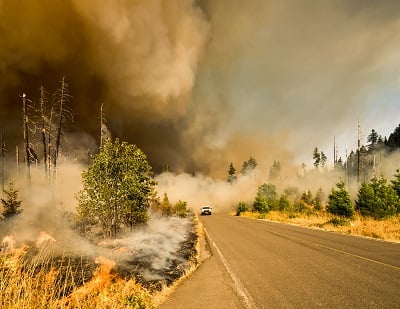Wildfire Anxiety - Relaxation Tips
Wildfire Anxiety - Relaxation Tips

A muffled crack of thunder, followed by a flash of light that lit up the bedroom wall. Then another, louder CRACK! I had been lying in bed awake since 1AM, for three hours, my husband next to me, deep asleep. But now the wind was pushing violently against our windows, and I woke him up. I did not want to be experiencing this alone. We pulled the slider open and stepped out onto our bedroom deck, surveying western Sonoma County. Every thirty seconds another jagged bolt of lightning flashed somewhere on the horizon. In forty years of living in California we’d ever seen anything like this. There were the thunderstorms when we visited my mother-in-law in Florida. But here we were missing a crucial counterbalance to the lightning. Rain.
When the previous night news reports had warned about the possibility of dry lightning it hadn’t seem possible. But now it was more real than anyone would have predicted. Could every strike of lightning start a fire? In our dry, heavily forested landscape what would that mean? “This feels like the end of the world,” my husband said, “Let’s pack the car and get out of here while we can.”
Flashback
Almost three years earlier, in October 2017, we were awakened at 1 AM by a friend calling us to tell us we needed to get out of our home, now! The smell of smoke filled the room. The electricity was out. We frantically pulled on our clothes and within five minutes we were in our car, inching our way through the smoke towards safety. An hour later our home and everything we owned was gone.
Much of the same emotions I felt at that time were here again, telling me to flee. But I knew something was different this time. Now, in our rebuilt home, standing in virtually the same spot in our bedroom, I recognized danger. But unlike the threat of three years before, this threat was not imminent. “Yes, let’s pack the car,” I said, “But I’m not going anywhere just yet.”
Safety and Security Shattered
Over the next 72 hours, the lightning strikes started hundreds of fires in California, Oregon and Washington, some that are still burning as I write this article. The smoke from these fires fouled the air, affecting millions of people hundreds of miles away. This at the same time we are suffering the worst pandemic in a hundred years, an economy threatening to slip into a depression, and the worst political and social unrest in decades.
What Should We Do?
As a CBT therapist working with clients who think their world is falling apart, and as a human being who has similar thoughts myself, I know that our natural instinct is to do something. Whether it is fighting or taking flight, or even freezing in place, our first reaction to the threat of loss is usually emotional reaction. We’re hard-wired this way. This leads to behaviors, like my husband wanting to jump in the car and get away. The problem with taking action when we are upset, is that it is unlikely to be wise action. The storm that morning was passing over us, casting bolts of lightning in every direction. Some of them could start fires, but which ones we’d have no way of knowing. Imagine my husband and I driving around Northern California, each time there was a strike of lightning ahead, turning the car around and driving a different direction. Imagine hundreds of thousands of other cars doing the same thing.
With an imminent threat, like a smoke-filled bedroom, our emotions are well equipped to guide us. But most of the threats we face today, though real, are not imminent, and thus, require wise action. And to unlock our own innate wisdom, we need to be able to tolerate the fight-flight emotions telling us to Do something now!
The therapy I provide for my anxious clients is simply teaching them to relax and lean into fear. Unless it becomes clear that action is called for, just being, not doing, is how we free ourselves from the trap of chronic fight-flight reactions to our anxiety.
Emotion & Meditation
In a perfect storm of uncertainty that we are all living in today it is of some comfort to me to know that spiritual masters agree. Pema Chodron, a Buddhist nun, has written extensively on how to find peace amid crisis. She says we must stay with our broken heart, our fear, our anger and outrage, that only by sticking with uncertainty do we learn to relax in the middle of chaos. This is the essence of mindfulness meditation—to place our attention on the thoughts, feelings, and emotions that are disturbing us in the moment, without attachment, judgment, storytelling, or problem-solving.
Many of us are familiar with the exercise of watching our thoughts without attachment, but it is often more difficult for us to do the same with our feelings. To curb our urges to resist and/or control our negative emotions, we must learn to experience the sensation of emotions in a grounded way, dropping our awareness out of our heads and into our bodies. The simplest path is to use our breath to open, surrender, allowing our muscles to soften, making space for our emotions to metabolize. Only when we can relax amidst the chaos of our emotions, can we conceive what is wise action.
Wise Action
The morning of the lightning storm, we packed our car with emergency supplies, water, tent, sleeping bags, and food. But we didn’t drive off looking for a safe place. We went for a silent hike in a wooded area that had burned the year before. In the distance we could see the storm continuing, but we could also see new growth coming back and many of the old oaks had survived. Nature has a way of healing itself. We too have a natural ability to heal ourselves. And I believe, that collectively, we will be able to heal from the crisis that we face—from fires, from the pandemic, from the political polarization and social injustice, to whatever we face in the future. The first step is for each of us to move from a fight -flight reaction to wise action.
Meditation for Emotion
By opening up to painful emotions, we are learning to relax into discomfort itself. As Pema Chodron a Buddhist nun often says, place your fearful mind in the cradle of loving kindness. This meditation will help you to be here for yourself, no matter what you are feeling. You can listen to this here.












